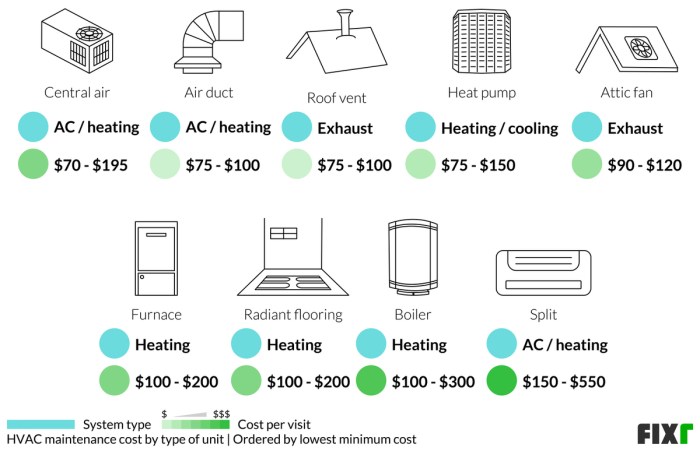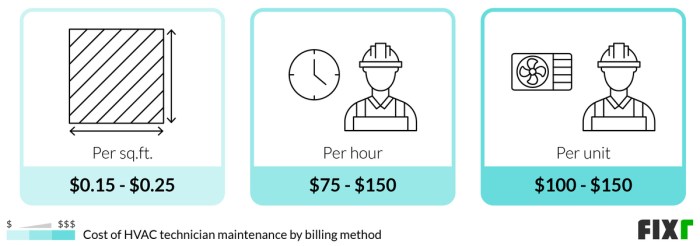Exploring HVAC Maintenance Cost: A Comprehensive Guide
HVAC maintenance cost is a crucial aspect of keeping your heating, ventilation, and air conditioning systems running efficiently. Understanding the factors, types of services, cost-saving strategies, and regional differences can help you make informed decisions about maintaining your HVAC system.
Get ready to dive into the world of HVAC maintenance costs with this detailed guide.
Factors affecting HVAC maintenance cost

When it comes to HVAC maintenance costs, several factors can influence how much you’ll need to spend to keep your system running smoothly. Understanding these factors can help you budget effectively and plan for any necessary maintenance or repairs.
Age of the system
The age of your HVAC system plays a significant role in determining maintenance costs. Older systems may require more frequent repairs and replacements of parts, which can add up over time. Additionally, as systems age, they may become less efficient, leading to higher energy bills.
System complexity
The complexity of your HVAC system can also impact maintenance expenses. Systems with more intricate designs or advanced features may be more costly to maintain due to the specialized knowledge and parts required for repairs. Simple systems, on the other hand, may be easier and cheaper to maintain.
Regular maintenance
Regular maintenance can help lower long-term HVAC costs by preventing major issues and prolonging the lifespan of your system. By scheduling routine inspections, cleaning, and tune-ups, you can catch small problems before they escalate into costly repairs. Investing in regular maintenance can ultimately save you money in the long run.
Types of maintenance services and their costs
Routine maintenance for HVAC systems includes tasks such as filter replacement, coil cleaning, and system inspections. The costs associated with these services can vary depending on the size of the system and the complexity of the work involved.
Preventive maintenance vs. Reactive maintenance
Preventive maintenance involves regular inspections and tune-ups to prevent breakdowns and ensure optimal performance. The cost of preventive maintenance is typically lower compared to reactive maintenance, as it helps to identify and address issues before they escalate into major problems.Reactive maintenance, on the other hand, involves addressing issues only when they arise, often leading to emergency repairs.
The costs for reactive maintenance can be significantly higher due to the urgency of the situation and the need for immediate attention.
Emergency repairs vs. Scheduled maintenance
Emergency repairs are unplanned and often occur outside of regular business hours, leading to higher service charges. The costs for emergency repairs can include overtime fees, expedited parts delivery, and additional labor costs.Scheduled maintenance, on the other hand, is planned in advance and can be budgeted for accordingly.
The costs for scheduled maintenance are typically lower as they are performed during regular business hours and do not involve the same level of urgency as emergency repairs.
Cost-saving strategies for HVAC maintenance
Regular maintenance of your HVAC system is crucial to ensure its efficiency and longevity. By implementing cost-saving strategies, you can reduce maintenance expenses and keep your system running smoothly for years to come.
Regular Filter Replacement
One of the simplest yet most effective cost-saving strategies for HVAC maintenance is to regularly replace the air filters. Clogged or dirty filters can restrict airflow, causing the system to work harder and consume more energy. By replacing the filters every 1-3 months, depending on usage, you can improve airflow, reduce strain on the system, and lower energy consumption, ultimately saving on maintenance costs in the long run.
Energy-Efficient Upgrades
Investing in energy-efficient upgrades for your HVAC system can significantly impact long-term maintenance expenses. Upgrades such as programmable thermostats, high-efficiency filters, and smart HVAC controls can improve system performance, reduce energy consumption, and minimize wear and tear on components. While the initial cost of these upgrades may be higher, the long-term savings on maintenance and energy bills make them a cost-effective investment.
Reputable Service Provider
Choosing a reputable HVAC service provider can also help in controlling maintenance costs. A qualified technician will perform thorough inspections, identify potential issues before they escalate, and provide expert maintenance services to keep your system in optimal condition. By scheduling regular maintenance with a trusted provider, you can prevent costly repairs, extend the lifespan of your HVAC system, and save money on overall maintenance expenses.
Regional variations in HVAC maintenance costs
When it comes to HVAC maintenance costs, the location plays a significant role in determining how much you might have to pay for services. Regional variations can impact expenses in various ways, including differences between urban and rural areas, as well as the influence of climate conditions.
Urban vs. Rural Areas
Urban areas tend to have higher HVAC maintenance costs compared to rural areas. This is often due to higher labor and overhead costs in cities. Additionally, the demand for HVAC services in urban areas is usually greater, leading to increased competition among service providers, which can drive up prices.
Climate Conditions
Climate conditions can also impact the frequency and cost of HVAC maintenance. In regions with extreme temperatures, HVAC systems may be used more frequently, leading to increased wear and tear. As a result, regular maintenance becomes essential to ensure optimal performance and efficiency, which can contribute to higher maintenance costs in these areas.
Closure

In conclusion, navigating HVAC maintenance costs involves considering various factors, choosing the right services, implementing cost-saving strategies, and being aware of regional differences. By being proactive in your approach to HVAC maintenance, you can ensure optimal performance and longevity for your system while keeping costs in check.
FAQ Explained
How does the age of the system impact HVAC maintenance costs?
The older the HVAC system, the more likely it is to require frequent repairs and maintenance, leading to higher costs.
What are the differences between preventive and reactive maintenance costs?
Preventive maintenance involves regular check-ups and minor adjustments to prevent major issues, while reactive maintenance addresses problems after they occur, often resulting in higher costs.
How can energy-efficient upgrades affect long-term maintenance expenses?
Energy-efficient upgrades can reduce overall energy consumption and strain on the HVAC system, potentially lowering maintenance costs over time.
What role does location play in influencing HVAC maintenance costs?
Location can impact costs due to varying labor rates, availability of parts, and environmental factors that affect the system’s performance.




